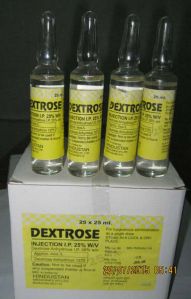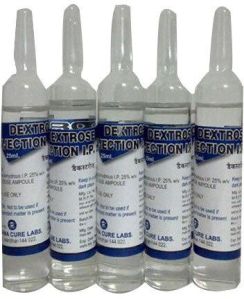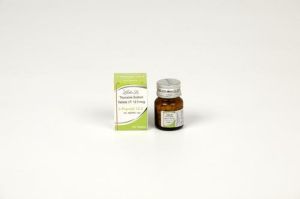
DNS Sodium Chloride Dextrose Injection
17 Per Bottle
5000 Bottle (MOQ)

10% Dextrose Injection
Get Price Quote
Best Deals from Dextrose Injection

Dextrose Sodium Chloride Injection
17 Per Bottle
1000000 Bottle (MOQ)

Multiple Electrolytes and Dextrose Injection Type V
Get Price Quote
1000 Bottles (MOQ)

Dextrose 5% Injection
25 - 30 Per Bottle
5000 bottles (MOQ)
Dextrose 25% Infusion is used for short term fluid replacement. It works by replenishing fluid loss. Thus, it treats hypovolemia that can result due to dehydration, injury, or burns.

Flexivent DNS - Sodium Chloride (0.9%) And Dextrose (5%) Injection IP
33 - 35 Per Bottle
5 Boxes (MOQ)

Bupivacaine Hydrochloride Dextrose Injection
28 Per
Features : Finely examined Minimal price More effective Quality approved Quick action Details : For Spinal Anaesthesia Preservatives are not added One ampoule of 4 ml Each Ml Contains : Bupivacaine Hydrochloride IP Equivalent to bupivacaine Hydrochloride Anhydrous: 5 Mg Dextrose IP: 80 Mg Water for Injection IP

Dextrose Injection
Get Price Quote

Sodium Chloride Dextrose Injection 500ml
Get Price Quote
5000 bottles piece (MOQ)
Description: D.N.S Infusion is used for Blood and fluid loss, Treatment of insulin hypoglycemia, Low calcium levels, Intravenous infusion as carbohydrate source, Low potassium levels, Low sodium levels and other conditions. D.N.S Infusion may also be used for purposes not listed in this medication guide. D.N.S Infusion contains Dextrose and Sodium Chloride as active ingredients. D.N.S Infusion works by increasing the blood volume; possessing the sodium chloride content; restoring blood glucose levels in patients with hypoglycemia and providing a source of carbohydrate calories when needed; Each 100 ml contains: Dextrose Anhydrous IP: - 5.00 gm (5% w/v). Sodium Chloride IP: - 0.9 gm (0.9% w/v). Water for Injection I.P:- q.s. mmol/L: - Na*154, Cl*154. Kcal/L: 170, Dextrose 50 gm/L. To be used with Non- Pyrogenic I.V administration with aseptic technique. Device Characteristic: Sterile Non-Pyrogenic single dose plastic container. Caution:- Even invisible damage to the bottle during transit, storage or handling may result in contamination. Don't use if the container is found leaking upon squeezing or if the solution is not clear. Solution containing visible solid particles not be used. Storage Conditions: Store it at room temperature. Key Feature: • WHO-GMP Certified • Packaging can be customize • Hygienically packed • Balanced composition • Stability • Highly effective

Dextrose Injection
Get Price Quote
Customers can obtain Dextrose Injection from us at highly affordable rates. The Dextrose Injection offered by us is prescribed by many medical practitioners for conforming to the norms set by medical regulatory bodies. To ensure customer satisfaction, we check the injection on stringent quality parameters before the final delivery. We are a reputed Manufacturer, Exporter & Supplier of Dextrose Injection from Bihar, India.

DNS 500 ML (NaCl 0.9% & DEXTROSE 5%)
18 Per Bottle
AS PER REQUIRED piece (MOQ)
brand name :- b braun nacl 0.9% & dextrose 5% mrp :- 31.19/-.

Dextrose Injection
Get Price Quote
Dextrose Injection Ip 25ml We are Offering 25% Dextrose Injection, Ip is a Sterile, Nonpyrogenic, Hypertonic Solution of Dextrose in Water for Injection Administered By Intravenous Injection to Restore Blood Glucose Levels in Hypoglycemia and as a Source of Carbohydrate Calories. 25% Dextrose Injection, Ip is a Dextrose (glucose) and Nutrient (carbohydrate) Replenisher.

Dextrose Injection
Get Price Quote

Sodium Chloride Dextrose Injection I.P (DNS)
18 - 40 Per piece
1000 Piece (MOQ)
Dextrose and Sodium Chloride Injections USP are sterile, nonpyrogenic and contain no bacteriostatic or antimicrobial agents. These products are intended for intravenous administration. Indications and Usage for Dextrose and Sodium Chloride Injection These intravenous solutions are indicated for use in adults and pediatric patients as sources of electrolytes, calories and water for hydration. Contraindications: These solutions are contraindicated where the administration of sodium or chloride could be clinically detrimental. Solutions containing dextrose may be contraindicated in patients with hypersensitivity to corn products. Warnings: The administration of intravenous solutions can cause fluid and/or solute overload resulting in dilution of serum electrolyte concentrations, overhydration, congested states or pulmonary edema. The risk of dilutional states is inversely proportional to the electrolyte concentration. The risk of solute overload causing congested states with peripheral and pulmonary edema is directly proportional to the electrolyte concentration. Geriatric Use: Clinical studies of Dextrose and Sodium Chloride Injections USP did not include sufficient numbers of subjects aged 65 and over to determine whether they respond differently from younger subjects. Other reported clinical experience has not identified differences in responses between elderly and younger patients. Over dosage: In the event of a fluid or solute overload during parenteral therapy, reevaluate the patient''s condition and institute appropriate corrective treatment.

Dextrose Injection
20 - 25 Per piece
10000 Piece (MOQ)
Dextrose injection is a sterile solution used to provide your body with extra water and carbohydrates (calories from sugar). It is used when a patient is not able to drink enough liquids or when additional fluids are needed.

Dextrose 5%,10% And 25% Injection
Get Price Quote

5 Percent Dextrose Injection
Get Price Quote
The 5% Dextrose solution is a sterile, non-pyrogenic solution for intravenous administration. There is no bacteriostatic or antimicrobial agent or any buffer system added. 5% dextrose solutions are isotonic and have a low pH, alternative peripheral veins should be used to avoid local vascular irritation. The daily energy requirement for physiological functions and body temperature is 1,600 kcal for men and 1,300 kcal for women. Energy need is high during pregnancy, breastfeeding, growing up, malnutrition, cases, trauma, burns and unreasonable situations. The most suitable energy source is carbohydrates, each gram of them gives 4.2 cal energy. 5% Dextrose solution has 200 calories in 1 liter. The maximum consumption rate of dextrose in the body is 500-800 mg / kg / hour. When given at a rate of 800 mg / kg, it is kept by the body close to 95% and is excreted through urine, causing glycosuria, as 5% exceeds the kidney threshold. It shows the same effect in solutions given quickly. When dextrose is given at a rate of 0.5g / kg per hour in normal subjects, it does not cause glycosuria.

Dopamine Hydrochloride
Get Price Quote
We are reckoned as one of the preeminent Dextrose Injection Manufacturers in India. The Dopamine Hydrochloride Injection offered by us is formulated for the treatment of hemodynamic imbalances present in shock syndrome caused by hypovolaemia, myocardial infarction trauma, endotoxins, septicaemia, open heart surgery, acute renal failure & chronic cardiac decompensation in congestive failure. Moreover, the company occupies distinguished position amidst the trusted Dopamine Hcl Injection Exporters.DOBUTASYSDopasys, an antishock Drug for heart, contains Dopamine Hydrochloride 40mg/ml and is available in the market in a 5ml Amber ampoule containing Dopamine, Hydrochloride 200mg/5ml.Clinical InformationIndicated for treatment of hypotension, Dopasys is used in the treatment of shock in congestive heart failure and cardiac insufficiency. Dopasys promotes the dilation of renal and mesenteric blood vessels and increases cardiac output with less effect on heart-rate when compared to isoprenaline. Dopasys is a neurotransmitter in the brain.Mode of ActionAt lower doses,Dopasys produces renal and mesenteric vasodilation while at higher doses, Dopasys stimulates both dopaminergic and adrenergic receptors producing cardiac stimulation and renal vasodilation. Dopasys increases heart rate and force of contraction. At low Infusion rates, vasodilation occurs in renal, mesenteric, coronary and cerebral beds. At higher rates, vascoconstriction occurs in skeletal muscles and also results in rise in Blood Pressure. Dosage & Mode of AdministrationClinton can be administered Intramuscularly or Intravenously. When given intravenously, CLINTONshould be diluted before use. CLINTONcan be given in doses of 300mg or 600mglntramuscularly e'.l'ery8 to 12 hours for treatment of various - infections including pneumococcal pneOrhonia, staphylococcal and streptococcal soft tissue infections.Absorption and FateDopamine in Dopasys is inactive when given by mouth. After intravenous infusion, it is rapidly metabolized to noradrenaline and it's effect lasts only for few minutes. Dopamine does not cross blood-brain barrier. Contraindications Precautions & Drug InteractionsDopasys should not be given to patients with uncorrected tachyarrhythmia or ventricular fibrillation. Dopasys should be given with extreme caution to patients anaesthetised with cyclopropane, halothane or other halogenated anaesthetics. If given to patients taking monoamine oxidase inhibitors, the initial dose should be reduced to one tenth the normal dose.Side EffectSide Effects of Dopamine administration include Nausea, Vomiting, tachycardia, palpitation, ectopic beats, anginal pains, headache and a suppression of pituitary secretion of thyroid stimulating hormone, growth hormone and prolactin.U.S.P.Following CPB, dobutamine in Dobutasys produces less tachycardia and a greater increase in Cardiac Index than isoprenaline. Dobutasys probably produces less tachycardia than dopamine after CPB, with a greater reduction in preload.

Dextrose Injection
Get Price Quote

Sodium Chloride Dextrose Injection
70 Per Piece